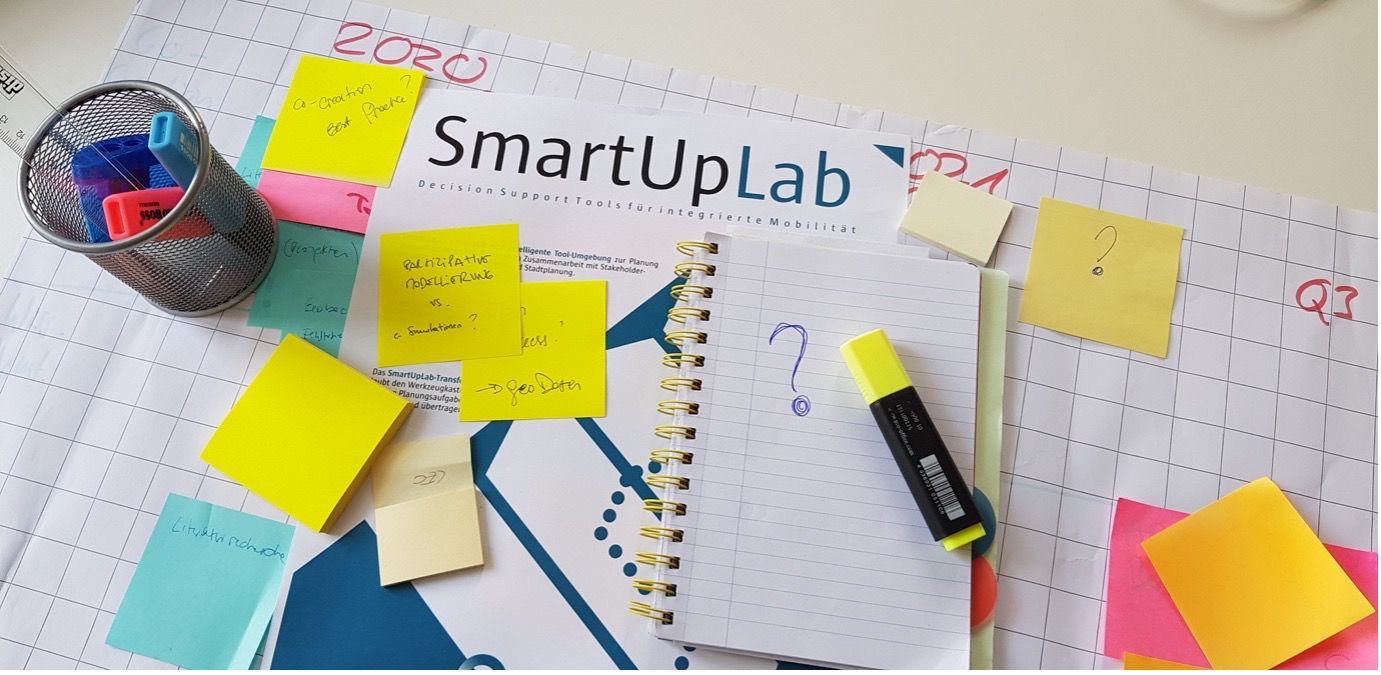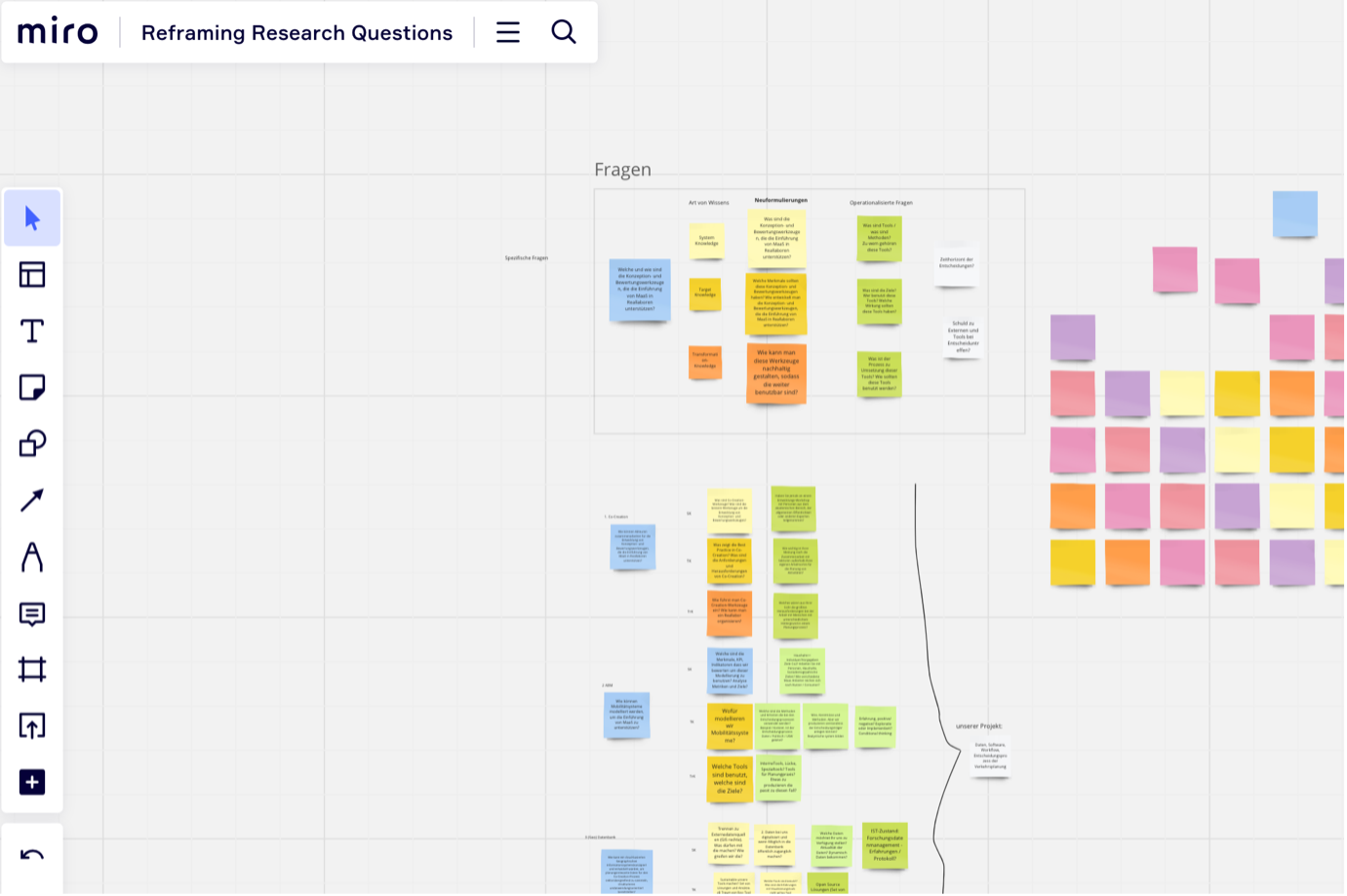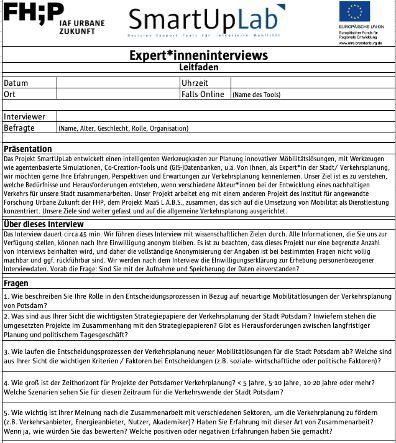Harmonizing Research Questions with the TTOK Tool
An online implementation of "Three Types of Knowledge" Tool in TD Research Project
In the context of a transdisciplinary research project at the University of Applied Sciences Potsdam, the Three Types of Knowledge Tool was implemented at an early project stage. The goal was to reflect upon and refine the research questions taking into consideration the different backgrounds and roles within the project team. As the workshop took place during the first months of the pandemic, the research team adapted the method for use in an online environment.

Project description
The ERDF-funded project "SmartUpLab - Decision-Support Tools for Integrated Urban Development" is a transdisciplinary research project that took place between 2020 and 2022 in the Institute for applied research Urban Future, at the University for Applied Sciences Potsdam (FHP). It developed a digital planning tool, which - embedded in a Living Lab - simplifies the handling of complex issues in urban development and mobility planning. SmartUpLab had a transdisciplinary research design based in participatory modelling that pursued a co-creation approach to develop the tool and appropriate methods for the involvement of different stakeholder groups in participatory planning processes.
Method & purpose
SmartUpLab faced many challenges typical of transdisciplinary research projects, and one of them was the heterogenic background of the team members, who came from different fields of practice and expertise. Therefore, an early challenge was to build a common understanding of the research and of the research questions. To this end, the SmartUpLab team introduced an adaptation of the Three Types of Knowledge Tool (Pohl, 2022), as a way to foreground and discuss the implicit and self-evident aspects of the topic and reformulate the research questions according to the three types of knowledge relevant for transdisciplinary research:
- Systematic knowledge: What is there?
- Target knowledge: What should be there?
- Transformational knowledge: How do we do it?
Bringing it online
Complying with the constraints of the Covid-19 pandemic, the on-site workshop was converted into an online workshop where all 5 team members participated. The process followed three steps:
1. Preparation of the participants:
The already existing research questions were collected in a document. The document also included a short explanation of the method as well as the objectives and the roles of the participants (participants and moderator). This document was shared with the participants one week before the workshop.
2. Conducting the workshop:
The team met online (in MS Teams). One of the team members took the role of facilitator. Flipcharts, markers and post-it notes were replaced by the digital whiteboard platform Miro (https://miro.com). The first 10 minutes were used to explain the method, tasks and objectives while presenting an example. Then the participants read and discussed the existing project questions. Lastly, the team engaged in the reformulation of the questions according to the three types of knowledge. As a result, the harmonised research questions for the project were adopted.

3. Creation of a question matrix:
During the refining process, many underlying questions were identified, that were relevant for the project implementation. These subsidiary questions were collected in a matrix. The matrix distinguished into type of question (general questions, complex or controversial questions) on the x axis and types of knowledge on the y axis. On the basis of this matrix the questions for the interview guide were developed.

Lessons learnt
- Most of the workshop participants were not familiar with the distinction among the three types of knowledge. For that reason, the early asynchronous preparation phase proved to be very helpful for the implementation of the method.
- The refined questions were more aligned with the three types of knowledge - systems knowledge, target knowledge, and transformation knowledge - than the original ones. They helped clarify the research objectives and provide a structured approach to the different types of knowledge relevant to sustainable mobility planning.
- To optimize the frame for discussion, the use of digital tools that the participants were already familiar with proved to be useful in ensuring the equal participation of all team members.
- The preparation and the online meeting required many resources in terms of time, setup of the collaboration tool as well as online facilitation skills. However, the collection of all questions that were raised during the discussion for the upcoming expert interviews was very much appreciated by the team members, as it helped to justify the resources involved and provided the basis for gathering input that was relevant for the different development sprints of the project.
Reflections/open questions
The adaptation to an online environment in the early days of the Covid-19 pandemic required a much more structured procedure as originally envisaged. If it were to be organized again with more experience in online environments, a less structured approach might facilitate the reformulation process.

